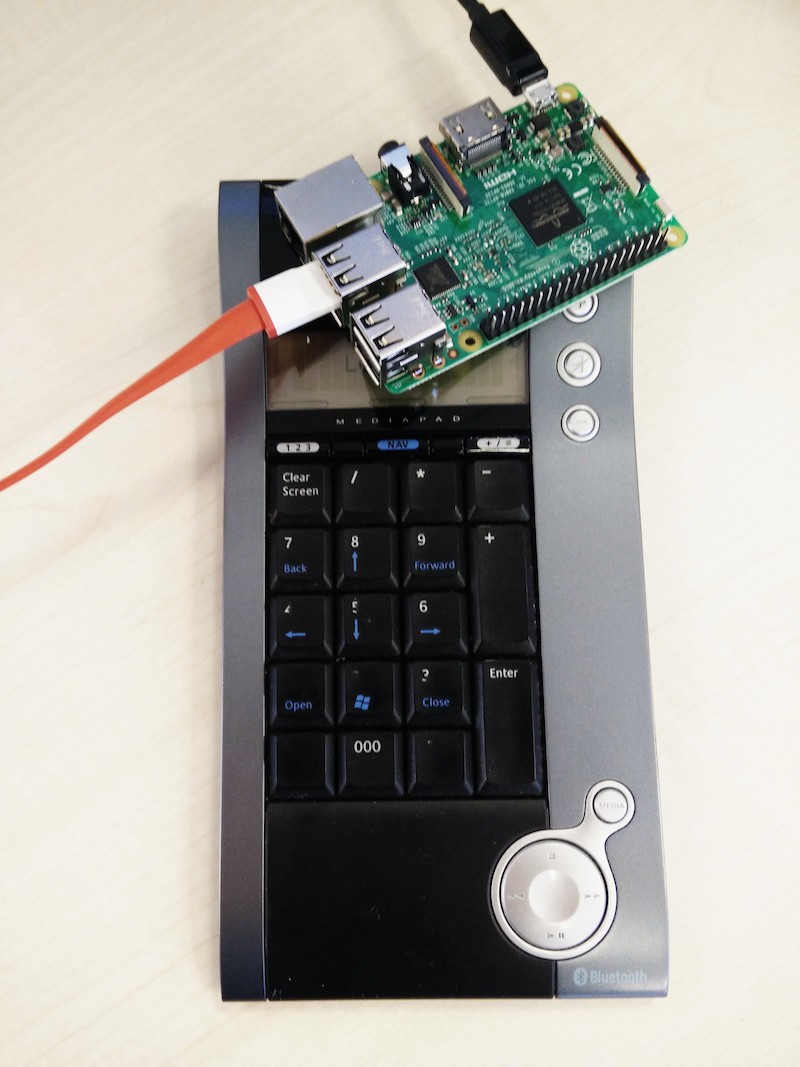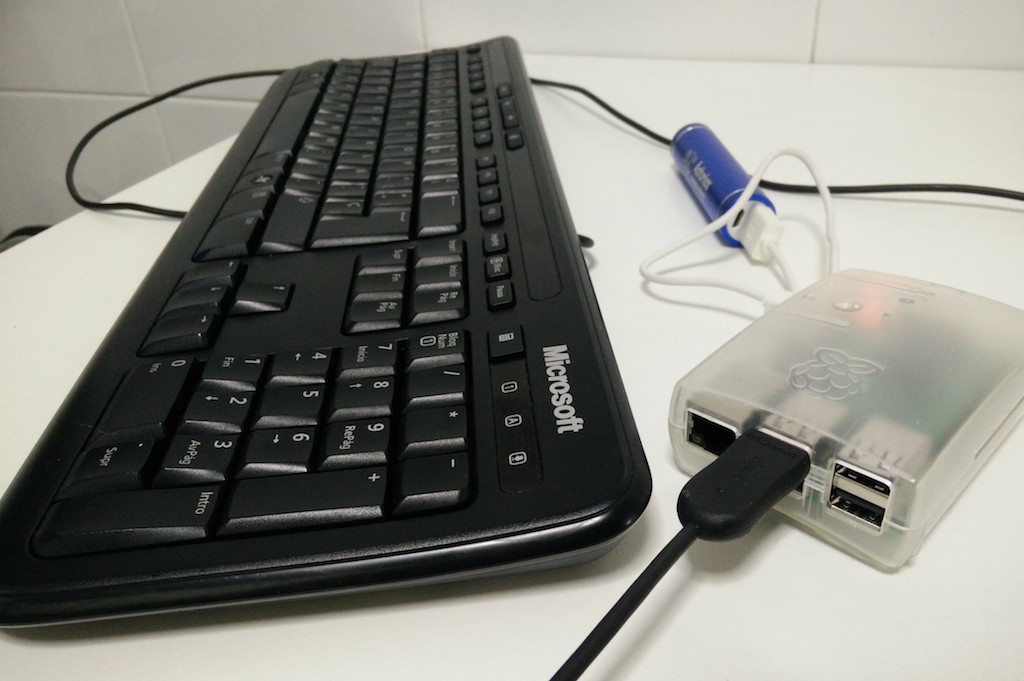This is a cheap option to implement an Activ-IoTy compatible checkpoint.
Athletics events are usually controlled by officials with different roles such as: judges, timekeepers and starters. Other competitions must rely on officials with other roles, even volunteers or marshals. This solution enables officials and volunteers to register athletes at checkpoints using a simple physical keypad to type athlete's bib numbers.
Since all athletes must wear a visible bib identifier, this implementation is compatible with the existing rules of official competitions. Keypad may be substituted by a complete keyboard. Of course, the keypad could be a capacitive screen (i.e., tablet, smartphone, etc.) but it is probed that data input operators are more efficient with physical typing devices. Also they may be robust, even waterproof.
This solution only needs a bluetooth input device connected to a Raspberry Pi, or similar.
The official located nearby the checkpoint type the bib number and press enter to register athletes' checkinw. The system will send the information (bib number + timestamp) of this checkin automatically.
The implementation is based on the module I developed to implement the Checkpoint based on a RFID Reader.
Both approaches implement a generic Reader that performs two main tasks: initialization (setup of the checkpoint) and doInventory.
class Reader(object):
def __init__(self):
pass
def initialize(self):
pass
def doInventory(self):
pass
They also use a common class Checkpoint that implements all the basic functionality of a checkpoint:
- Get reliable timestamps from a common NTP server;
- Establish a connection with the MQTT server (once it is connected and set-up sends a
{checkpointId}/readymessage); - Through a
Reader, read either bib numbers or RFID EPCs that are related to each competitor (once they are read, they are sent to the MQTT queue under the topic{checkpointId}/checkin); - This is executed in an infinite loop. The controller will be in charge of deal with the messages and do the business logic.
The Checkpoint is implemented using ntplib and paho.mqtt. This is a summary of the code:
# ... more imports ...
import ntplib
import paho.mqtt.publish as publish
class Checkpoint(object):
TOPIC_READY = 'ready'
TOPIC_CHECKIN = 'checkin'
def __init__(self, id, reader, mqttBrokerHost, mqttBrokerPort=1883):
'''
:param id: String with the identifier of the Checkpoint
:param reader: Ind903Reader object (or other Reader) that will do the inventory
:param mqttBrokerHost: String with the hostname of the MQTT broker
:param mqttBrokerPort: (int) with the port of the MQTT broker (1883 by default)
'''
self.id = id
self.reader = reader
self.mqttBrokerHost = mqttBrokerHost
self.mqttBrokerPort = mqttBrokerPort
self.timestampOffset = self.getOffsetNTPTime()
def checkinCompetitor(self, idCompetitorEPC, idCompetitorBibNumber):
'''
Method to be called once a competitor do a check-in.
This is a callback method to be send to the reader.
It sends a MQTT message to the broker
:param idCompetitor: String with the ID of the competitor that the reader detected.
'''
competitor = {}
if (idCompetitorEPC != None):
competitor["epc"] = idCompetitorEPC;
if (idCompetitorBibNumber != None):
competitor["bib"] = idCompetitorBibNumber;
messageCheckin = { "checkpoint" : self.id , "timestamp" : self.getTimestamp(), "competitor" : competitor }
topic = self.id + "/" + self.TOPIC_CHECKIN
publish.single(topic, json.dumps(messageCheckin), hostname=self.mqttBrokerHost)
print(topic + " topic to MQTT:")
print(json.dumps(messageCheckin))
def execute(self):
messageReady = { "checkpoint" : self.id , "timestamp" : self.getTimestamp() }
topic = self.id + "/" + self.TOPIC_READY
publish.single(topic, json.dumps(messageReady), hostname=self.mqttBrokerHost)
print(topic + " topic to MQTT:")
print(json.dumps(messageReady))
self.reader.initialize()
self.reader.doInventory(self.checkinCompetitor)
def getOffsetNTPTime(self):
'''
Get timestamp from a NTP server and stores the offset with the internal clock.
:return: (float) with the difference between the local clock and the NTP time (in seconds)
'''
c = ntplib.NTPClient()
response = c.request('europe.pool.ntp.org', version=3)
# convert from seconds since 1900 to seconds since 1970
ntpUnixtime = response.tx_timestamp - 2208988800
timestampOffset = time.time() - ntpUnixtime;
return timestampOffset
def getTimestamp(self):
'''
Returns the local time plus the offset registered at the beginning.
:return: long with the current timestamp (unix time)
'''
return int(time.time() + self.timestampOffset)
The key part of this code is the execution itself:
def execute(self):
...
self.reader.doInventory(self.checkinCompetitor)
When the checkpoint is correctly setup, the reader is asked to start the inventory of runners. Once either a bibNumber (from a keyboard input) or a EPC (from the RFID reader) is detected the checkinCompetitor callback is executed. This method creates the message for the MQTT receivers that will contains the information about the competitor id.
The functionality of this specific checkpoint is implemented using the following main method:
# ... imports
if __name__ == '__main__':
reader = usb_keypad_reader.USBKeypadReader()
checkpoint = checkpoint.Checkpoint('Keypad-1', reader, 'activioty.ddns.net')
checkpoint.execute()
Any other USB keyboard is accepted as well.
This approach may be extended to other checkin mechanisms such as bar-code readers or computer vision analyzers. Perhaps for the next release ;-)

